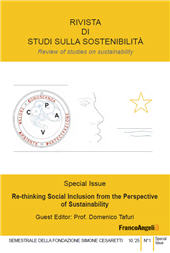Environmental sustainability education and its impact on psychological well-being : a cognitive-behavioral approach
69-79 p.
Psychological well-being is essential for promoting sustainable behaviors, yet awareness alone is insufficient. Economic and cognitive barriers often hinder eco-friendly choices. This article offers a theoretical reflection, supported by academic literature, on the applicability of Cognitive Behavioral Therapy (CBT) in fostering sustainable lifestyles. CBT can reduce cognitive distortions, enhance self-efficacy, and support value-based decisions. Techniques like mindfulness, nudging, and reframing all-or-nothing thinking can help bridge the intention–behavior gap. Schools and workplaces are key contexts for applying these strategies to promote lasting, environmentally responsible habits. A structured effort at social and educational levels is needed, but CBT provides key tools for a lasting sustainable mindset. [Publisher's text]
Psychological well-being is essential for promoting sustainable behaviors, yet awareness alone is insufficient. Economic and cognitive barriers often hinder ecofriendly choices. This article offers a theoretical reflection, supported by academic literature, on the applicability of Cognitive Behavioral Therapy (CBT) in fostering sustainable lifestyles. CBT can reduce cognitive distortions, enhance self efficacy, and support value-based decisions. Techniques like mindfulness, nudging, and reframing all-or-nothing thinking can help bridge the intention–behavior gap. Schools and workplaces are key contexts for applying these strategies to promote lasting, environmentally responsible habits. A structured effort at social and educational levels is needed, but CBT provides key tools for a lasting sustainable mindset.[Publisher's text]
-
Articoli dello stesso fascicolo (disponibili singolarmente)
-
Informazioni
Codice DOI: 10.3280/riss2025oa19880
ISSN: 2239-1959
PAROLE CHIAVE
- cognitive behavioral therapy, mindfulness, Environmental Sustainability, personal values, psychology


